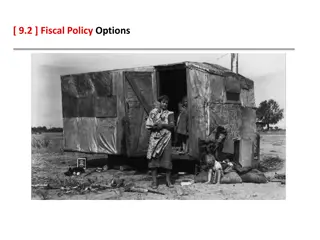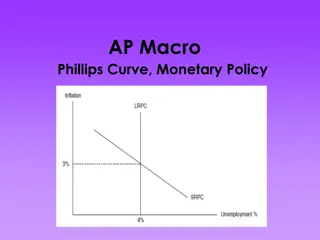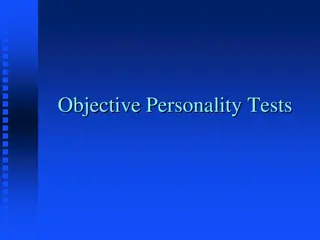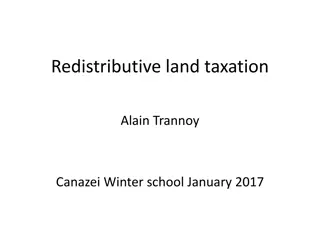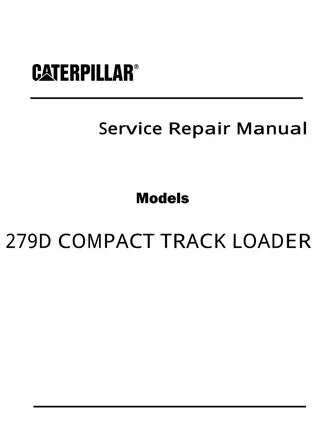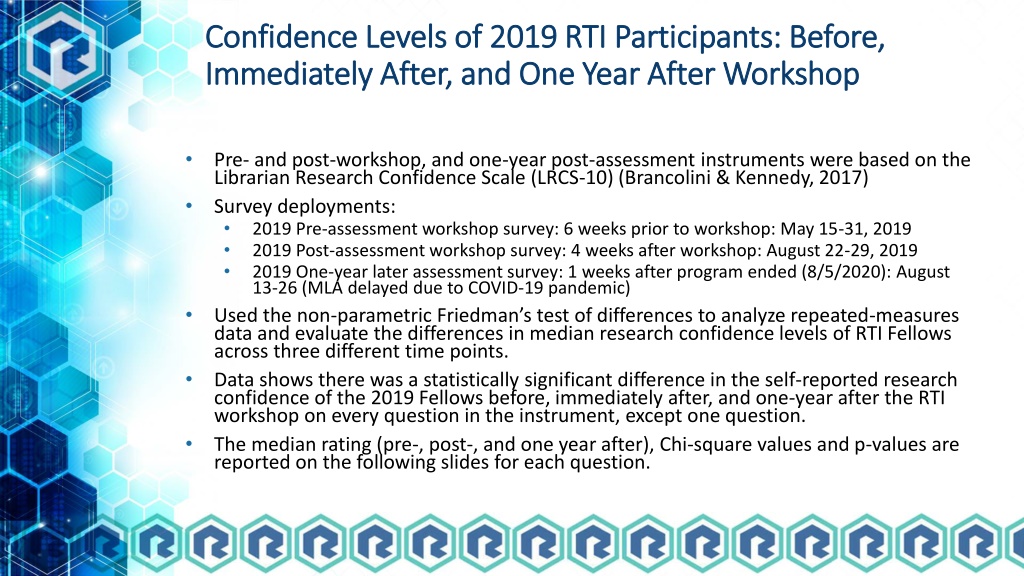
Research Confidence Levels of 2019 RTI Participants: Analysis Results
Analyzing the confidence levels of 2019 RTI participants before, immediately after, and one year after the workshop using the Librarian Research Confidence Scale. The study utilized surveys at different time points and employed statistical analysis to identify significant differences in research confidence levels across the three time periods. Detailed results and statistical values for each question are presented, indicating notable improvements in confidence levels over time.
Download Presentation

Please find below an Image/Link to download the presentation.
The content on the website is provided AS IS for your information and personal use only. It may not be sold, licensed, or shared on other websites without obtaining consent from the author. Download presentation by click this link. If you encounter any issues during the download, it is possible that the publisher has removed the file from their server.
E N D
Presentation Transcript
Confidence Levels of 2019 RTI Participants: Before, Confidence Levels of 2019 RTI Participants: Before, Immediately After, and One Year After Workshop Immediately After, and One Year After Workshop Pre- and post-workshop, and one-year post-assessment instruments were based on the Librarian Research Confidence Scale (LRCS-10) (Brancolini & Kennedy, 2017) Survey deployments: 2019 Pre-assessment workshop survey: 6 weeks prior to workshop: May 15-31, 2019 2019 Post-assessment workshop survey: 4 weeks after workshop: August 22-29, 2019 2019 One-year later assessment survey: 1 weeks after program ended (8/5/2020): August 13-26 (MLA delayed due to COVID-19 pandemic) Used the non-parametric Friedman s test of differences to analyze repeated-measures data and evaluate the differences in median research confidence levels of RTI Fellows across three different time points. Data shows there was a statistically significant difference in the self-reported research confidence of the 2019 Fellows before, immediately after, and one-year after the RTI workshop on every question in the instrument, except one question. The median rating (pre-, post-, and one year after), Chi-square values and p-values are reported on the following slides for each question.
2019 Participants Research Confidence Levels Before, Immediately After, and One Year After Workshop (1) Rated with Likert scale: 5: Very Confident; 4 Confident; 3 Moderately Confident; 2 Slightly Confident; 1 Not At All Confident COHORT 2 Median Rating (Pre) Median Rating (Post) Median Rating (One Yr Later) Chi-square value p-value (p<.05) Questions about skills needed for a research project 1. Turning my topic into a question. 3 4 4 15.125 .001 2. Designing a project to answer my question. 3 4 4 26.793 .000 3. Selecting methods and procedures for my question. 2 4 4 28.557 .000 4. Developing plan and timeline for my study. 3 4 4 24.295 .000 5. Identifying appropriate information sources in which to conduct my literature search. 2.5 5 5 14.649 .001
2019 Participants Research Confidence Levels: Before, Immediately After, and One Year After Workshop (2) Rated with Likert scale: 5: Very Confident; 4 Confident; 3 Moderately Confident; 2 Slightly Confident; 1 Not At All Confident COHORT 2 Median Rating (Pre) Median Rating (Post) Median Rating (One Yr Later) Chi-square value p-value (p<.05) Questions about skills needed for a research project 6. Using relevant keywords and search strategies to discover literature about the research topic. 4 5 5 11.302 .004 7. Assessing and synthesizing literature that is relevant to your research question. 4 4 4.5 12.667 .002 8. Using a theoretical framework to inform the research design of your study. 1.5 3 3 14.880 .001 9. Identifying sources of research funding and funding agency requirements. 2 3.5 Z-score -2.614 .009 10. Choosing an appropriate data gathering procedure. 2 4 4 30.145 .000
2019 Participants Research Confidence Levels Before, Immediately After, and One Year After Workshop (3) Rated with Likert scale: 5: Very Confident; 4 Confident; 3 Moderately Confident; 2 Slightly Confident; 1 Not At All Confident COHORT 2 Median Rating (Pre) Median Rating (Post) Median Rating (One Yr Later) Chi-square value p-value (p<.05) Questions about skills needed for a research project 11. Determining which members of a population to include in your study. 2 4 4 20.698 .000 12. Knowing how to design a focus group. 2 3.5 4 23.639 .000 13. Knowing how to run a focus group. 2 3 4 20.109 .000 14. Knowing how to design an interview. 2 4 4 26.655 .000 15. Knowing how to conduct an interview. 2 4 4 27.898 .000
2019 Participants Research Confidence Levels Before, Immediately After, and One Year After Workshop (4) Rated with Likert scale: 5: Very Confident; 4 Confident; 3 Moderately Confident; 2 Slightly Confident; 1 Not At All Confident COHORT 2 Median Rating (Pre) Median Rating (Post) Median Rating (One Yr Later) Chi-square value p-value (p<.05) Questions about skills needed for a research project 16. Knowing how to design a survey. 2 4 Z-score -3.668 .000 17. Knowing how to administer a survey. 2.5 4 4 26.308 .000 18. Knowing institutional processes and standards to ensure that your study is conducted ethically. 3 4 5 22.291 .000 19. Knowing what method of data analysis you would use for your study. 1.5 4 3 27.594 .000 20. Knowing what type of assistance you might need to undertake data analysis (e.g., data/statistics consulting, transcription, software). 1 4 4 25.733 .000
2019 Partcipants Research Confidence Levels Before, Immediately After, and One Year After Workshop (5) Rated with Likert scale: 5: Very Confident; 4 Confident; 3 Moderately Confident; 2 Slightly Confident; 1 Not At All Confident95 COHORT 2 Median Rating (Pre) Median Rating (Post) Median Rating (One Yr Later) Chi-square value p-value (p<.05) Questions about skills needed for a research project 21. Knowing how to manage the data you have gathered. 4 4 4 5.434 .066 22. Knowing how to code qualitative data to identify themes and sub-themes. 2 4 4 26.333 .000 23. Reporting results in written format. 3 4 4.5 23.705 .000 24. Reporting results verbally. 2.5 4.5 4.5 23.186 .000 25. Identifying appropriate places to disseminate results. 3 4 4.5 17.273 .000 26. Tracking the dissemination and impact of your research. 2.5 4 4 19.283 .000 Median Rating Totals 64 96 106.5



